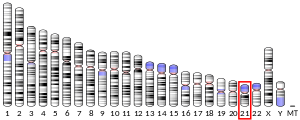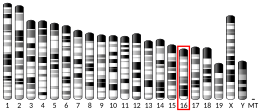
KNOWPIA
WELCOME TO KNOWPIA
Summary
Sodium/myo-inositol cotransporter is a protein that in humans is encoded by the SLC5A3 gene.[5][6]
| SLC5A3 | |||||||||||||||||||||||||||||||||||||||||||||||||||
|---|---|---|---|---|---|---|---|---|---|---|---|---|---|---|---|---|---|---|---|---|---|---|---|---|---|---|---|---|---|---|---|---|---|---|---|---|---|---|---|---|---|---|---|---|---|---|---|---|---|---|---|
| Identifiers | |||||||||||||||||||||||||||||||||||||||||||||||||||
| Aliases | SLC5A3, BCW2, SMIT, SMIT1, SMIT2, solute carrier family 5 member 3 | ||||||||||||||||||||||||||||||||||||||||||||||||||
| External IDs | OMIM: 600444 MGI: 1858226 HomoloGene: 31412 GeneCards: SLC5A3 | ||||||||||||||||||||||||||||||||||||||||||||||||||
| |||||||||||||||||||||||||||||||||||||||||||||||||||
| |||||||||||||||||||||||||||||||||||||||||||||||||||
| |||||||||||||||||||||||||||||||||||||||||||||||||||
| |||||||||||||||||||||||||||||||||||||||||||||||||||
| |||||||||||||||||||||||||||||||||||||||||||||||||||
| Wikidata | |||||||||||||||||||||||||||||||||||||||||||||||||||
| |||||||||||||||||||||||||||||||||||||||||||||||||||
Expression of the myo-inositol transport protein is regulated by osmotic stress.[7]
See also edit
References edit
- ^ a b c GRCh38: Ensembl release 89: ENSG00000198743 – Ensembl, May 2017
- ^ a b c GRCm38: Ensembl release 89: ENSMUSG00000089774 – Ensembl, May 2017
- ^ "Human PubMed Reference:". National Center for Biotechnology Information, U.S. National Library of Medicine.
- ^ "Mouse PubMed Reference:". National Center for Biotechnology Information, U.S. National Library of Medicine.
- ^ Berry GT, Mallee JJ, Kwon HM, Rim JS, Mulla WR, Muenke M, Spinner NB (Jul 1995). "The human osmoregulatory Na+/myo-inositol cotransporter gene (SLC5A3): molecular cloning and localization to chromosome 21". Genomics. 25 (2): 507–13. doi:10.1016/0888-7543(95)80052-N. PMID 7789985.
- ^ "Entrez Gene: SLC5A3 solute carrier family 5 (inositol transporters), member 3".
- ^ Lee SD, Choi SY, Lim SW, Lamitina ST, Ho SN, Go WY, Kwon HM (2011). "TonEBP stimulates multiple cellular pathways for adaptation to hypertonic stress: Organic osmolyte-dependent and -independent pathways". AJP: Renal Physiology. 300 (3): F707–F715. doi:10.1152/ajprenal.00227.2010. PMC 3064130. PMID 21209002.
Further reading edit
- Kwon HM, Yamauchi A, Uchida S, et al. (1992). "Cloning of the cDNa for a Na+/myo-inositol cotransporter, a hypertonicity stress protein". J. Biol. Chem. 267 (9): 6297–301. doi:10.1016/S0021-9258(18)42695-6. PMID 1372904.
- Berry GT, Mallee JJ, Blouin JL, Antonarakis SE (1996). "The 21q22.1 STS marker, VN02 (EST00541 cDNA), is part of the 3' sequence of the human Na+/myo-inositol cotransporter (SLC5A3) gene". Cytogenet. Cell Genet. 73 (1–2): 77–8. doi:10.1159/000134311. PMID 8646889.
- Mallee JJ, Atta MG, Lorica V, et al. (1998). "The structural organization of the human Na+/myo-inositol cotransporter (SLC5A3) gene and characterization of the promoter". Genomics. 46 (3): 459–65. doi:10.1006/geno.1997.5055. PMID 9441750.
- Porcellati F, Hlaing T, Togawa M, et al. (1998). "Human Na(+)-myo-inositol cotransporter gene: alternate splicing generates diverse transcripts". Am. J. Physiol. 274 (5 Pt 1): C1215–25. doi:10.1152/ajpcell.1998.274.5.C1215. PMID 9612208. S2CID 22626824.
- Rim JS, Atta MG, Dahl SC, et al. (1998). "Transcription of the Sodium/myo-Inositol Cotransporter Gene Is Regulated by Multiple Tonicity-responsive Enhancers Spread over 50 Kilobase Pairs in the 5′-Flanking Region". J. Biol. Chem. 273 (32): 20615–21. doi:10.1074/jbc.273.32.20615. PMC 2365891. PMID 9685419.
- Hattori M, Fujiyama A, Taylor TD, et al. (2000). "The DNA sequence of human chromosome 21". Nature. 405 (6784): 311–9. Bibcode:2000Natur.405..311H. doi:10.1038/35012518. PMID 10830953.
- Ota T, Suzuki Y, Nishikawa T, et al. (2004). "Complete sequencing and characterization of 21,243 full-length human cDNAs". Nat. Genet. 36 (1): 40–5. doi:10.1038/ng1285. PMID 14702039.
- Suzuki Y, Yamashita R, Shirota M, et al. (2004). "Sequence Comparison of Human and Mouse Genes Reveals a Homologous Block Structure in the Promoter Regions". Genome Res. 14 (9): 1711–8. doi:10.1101/gr.2435604. PMC 515316. PMID 15342556.
- Kimura K, Wakamatsu A, Suzuki Y, et al. (2006). "Diversification of transcriptional modulation: Large-scale identification and characterization of putative alternative promoters of human genes". Genome Res. 16 (1): 55–65. doi:10.1101/gr.4039406. PMC 1356129. PMID 16344560.
- Thangaraju M, Gopal E, Martin PM, et al. (2007). "SLC5A8 triggers tumor cell apoptosis through pyruvate-dependent inhibition of histone deacetylases". Cancer Res. 66 (24): 11560–4. doi:10.1158/0008-5472.CAN-06-1950. PMID 17178845.






